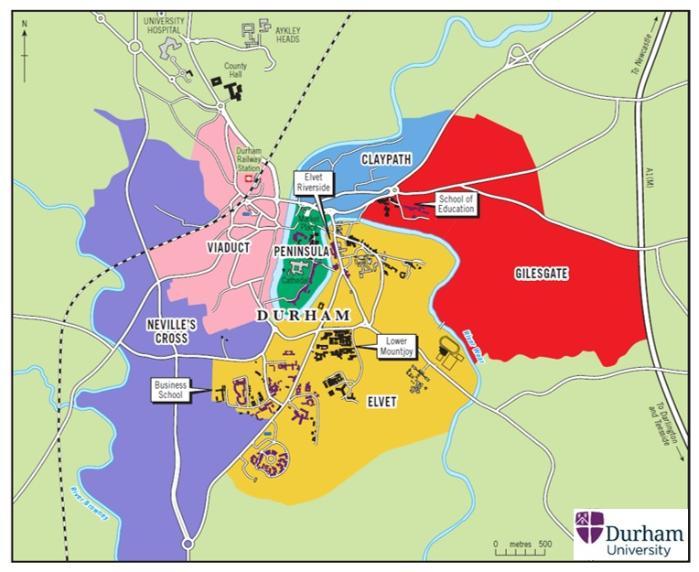Househunting Tips
Finding somewhere to rent is a big decision. Once you have signed a tenancy agreement it will be legally binding and you will have to continue paying the rent until the end of the tenancy. Although some tenancies may allow you to leave before the end of the tenancy period, most landlords in Durham expect students to sign a tenancy agreement for a year whether you are living there all the time or not. It is therefore essential that you consider carefully whether the property is right for you. The following questions will help you to consider the different aspects you need to take into account when looking for somewhere to live.
Rent/Affordability
How much is your rent per month? Is this within your budget? Does the rent include the monthly bills such as gas, electricity and water? If not, try to find out an estimate of what these will cost from the landlord, current tenants or a comparison website. If you choose a bills-inclusive option you will be paying for those bills every month, including when you are not there. Durham has a variety of rental properties with varying rent rates and it is therefore possible to pay a reasonable rent if you are prepared to consider all the options.
Where are you going to live?
Are you happy with the area you have chosen to live in? Durham is a very small city with many rental properties within walking distance of the centre and less than 1 mile (1.6km) from the main University Lower Mountjoy site, departments and colleges. Some areas in or near the city centre are extremely popular with undergraduate students and this is reflected in the rental prices. If you are prepared to choose other areas in and around Durham, you may find that you can save a substantial amount on your weekly rent. Many postgraduate students who live in private accommodation choose this option. The majority of all areas are on a main public bus route and can be used at a reduced rate with the use of your campus card (see Durham University | Bus Routes & Tickets | Arriva Bus for more details) . The below area map of Durham will help you with your search.

When should you start looking for private accommodation?
Durham has a large number of Estate Agents, individual landlords and rental property available with a growing volume of accommodation for students. We would advise you not to rush in and to take your time in carefully considering all factors before signing a tenancy agreement. Housing for undergraduate accommodation is usually advertised from around November to February for tenancies for the following academic year, with contracts starting from July onwards. Housing for postgraduate accommodation is usually advertised from around April until October for contracts starting in September or October. Most properties have fixed-term contracts of 12 months unless the advert states otherwise. Undergraduate students sign contracts that start 01 July and pay rent for the summer months. Postgraduate student contracts normally start from 01 September and last for 12 months.
Flatmates?
Can you imagine living with the flatmates you have chosen for a year? Do you get on with everyone in your chosen group? If you and your flatmates sign a contract with all your names on it, you are ‘jointly and severally liable’ which means that you are all liable for the whole of the rent. It is therefore essential that you are completely happy with who you have chosen to live with before you sign a contract.

Viewing the Property
Make sure you are aware of what is included in the property. Some properties may not include items like crockery, utensils or larger items like microwaves and kettles. Check the advert and ask the landlord if you are in doubt. If the landlord promises that certain works will be carried out, or there will be furniture included that is not currently in the property then ask for confirmation in writing.
Administration Fees
Before signing a contract, check with the landlord whether any administration fees will be charged. The Tenant Fees Act means that you should not be charged any fees for registering with a landlord or agent, for searching for properties or administrative fees once you have found a property and are signing the contract. Fees can vary and you should find out what the fee will be before agreeing to anything.
Do you understand the contract?
Make sure you understand all clauses in your contract before signing it. The landlord should give you at least 24 hours’ notice for you to check your contract. A tenancy agreement is a legally binding document. It is therefore vital to be happy with the location, flatmates, rent levels of your accommodation and any other details outlined before signing a contract which can't be cancelled. To make sure the contract is legal and adequately protects your rights, please refer to the Durham Students' Union Advice Service webpages relating to contract checking.
Deposits
Check if you will have to pay a deposit and any rent in advance. By law, security deposits must be protected and placed in a government scheme. Your landlord must provide you with information about what scheme they are using as well other specific information. See further information about tenancy deposit schemes.

Home Safety
Landlords have legal obligations to ensure the safety of tenants. The Homes Act means they must get a gas safety certificate for every appliance in the property and have this available for tenants to view, ensure furniture meet fire safety standards, as well as ensure electrical equipment provided is safe.
Why do I have to show my landlord any documentation (passport, student visa, other immigration documents)?
Landlords, home owners and Letting Agents are required by law to make sure that someone has the right to rent in England before letting the property. Your landlord will ask for proof that you have the Right to Rent in the UK. More information about this regulation can be found here.
More information about privately renting can be found on various government sites as well as through independent organisations like Shelter.


/prod01/prodbucket01/media/durham-university/external-location-photography-/city-shots-/71746_CastleCourtyard-4-2499X1009.jpg)